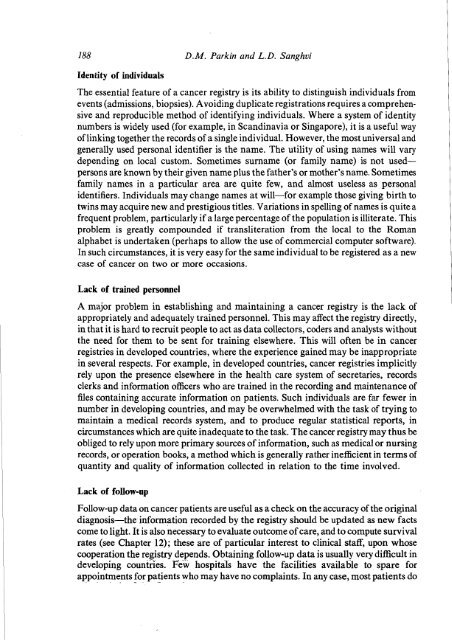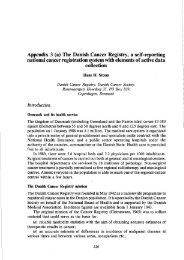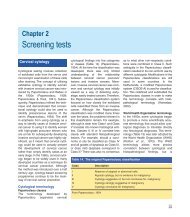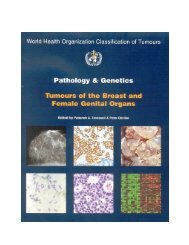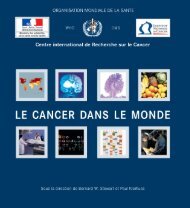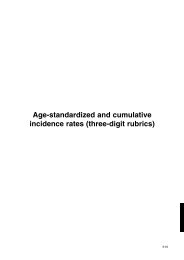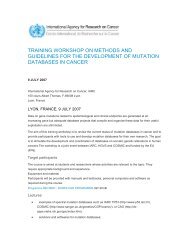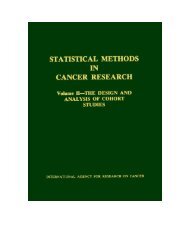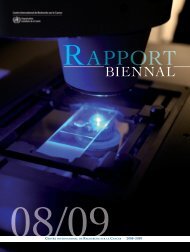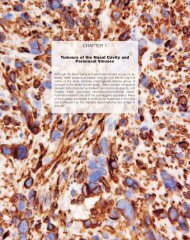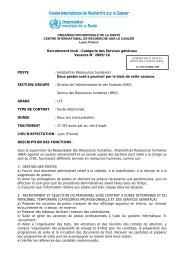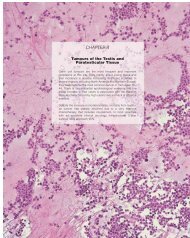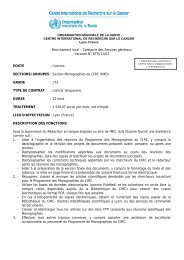Cancer Registration: Principles and Methods - IARC
Cancer Registration: Principles and Methods - IARC
Cancer Registration: Principles and Methods - IARC
Create successful ePaper yourself
Turn your PDF publications into a flip-book with our unique Google optimized e-Paper software.
188 D.M. Parkin <strong>and</strong> L.D. Sanghvi<br />
Identity of individuals<br />
The essential feature of a cancer registry is its ability to distinguish individuals from<br />
events (admissions, biopsies). Avoiding duplicate registrations requires a comprehensive<br />
<strong>and</strong> reproducible method of identifying individuals. Where a system of identity<br />
numbers is widely used (for example, in Sc<strong>and</strong>inavia or Singapore), it is a useful way<br />
of linking together the records of a single individual. However, the most universal <strong>and</strong><br />
generally used personal identifier is the name. The utility of using names will vary<br />
depending on local custom. Sometimes surname (or family name) is not usedpersons<br />
are known by their given name plus the father's or mother's name. Sometimes<br />
family names in a particular area are quite few, <strong>and</strong> almost useless as personal<br />
identifiers. Individuals may change names at will-for example those giving birth to<br />
twins may acquire new <strong>and</strong> prestigious titles. Variations in spelling of names is quite a<br />
frequent problem, particularly if a large percentage of the population is illiterate. This<br />
problem is greatly compounded if transliteration from the local to the Roman<br />
alphabet is undertaken. (perhaps to allow the use of commercial computer software).<br />
In such circumstances, it is very easy for the same individual to be registered as a new<br />
case of cancer on two or more occasions.<br />
Lack of trained personnel<br />
A major problem in establishing <strong>and</strong> maintaining a cancer registry is the lack of<br />
appropriately <strong>and</strong> adequately trained personnel. This may affect the registry directly,<br />
in that it is hard to recruit people to act as data collectors, coders <strong>and</strong> analysts without<br />
the need for them to be sent for training elsewhere. This will often be in cancer<br />
registries in developed countries, where the experience gained may be inappropriate<br />
in several respects. For example, in developed countries, cancer registries implicitly<br />
rely upon the presence elsewhere in the health care system of secretaries, records<br />
clerks <strong>and</strong> information officers who are trained in the recording <strong>and</strong> maintenance of<br />
files containing accurate information on patients. Such individuals are far fewer in<br />
number in developing countries, <strong>and</strong> may be overwhelmed with the task of trying to<br />
maintain a medical records system, <strong>and</strong> to produce regular statistical reports, in<br />
circumstances which are quite inadequate to the task. The cancer registry may thus be<br />
obliged to rely upon more primary sources of information, such as medical or nursing<br />
records, or operation books, a method which is generally rather inefficient in terms of<br />
quantity <strong>and</strong> quality of information collected in relation to the time involved.<br />
Lack of follow-up<br />
Follow-up data on cancer patients are useful as a check on the accuracy of the original<br />
diagnosis-the information recorded by the registry should be updated as new facts<br />
come to light. It is also necessary to evaluate outcome of care, <strong>and</strong> to compute survival<br />
rates (see Chapter 12); these are of particular interest to clinical staff, upon whose<br />
cooperation the registry depends. Obtaining follow-up data is usually very difficult in<br />
developing countries. Few hospitals have the facilities available to spare for<br />
appointments . - for patients who may have no complaints. In any case, most patients do


